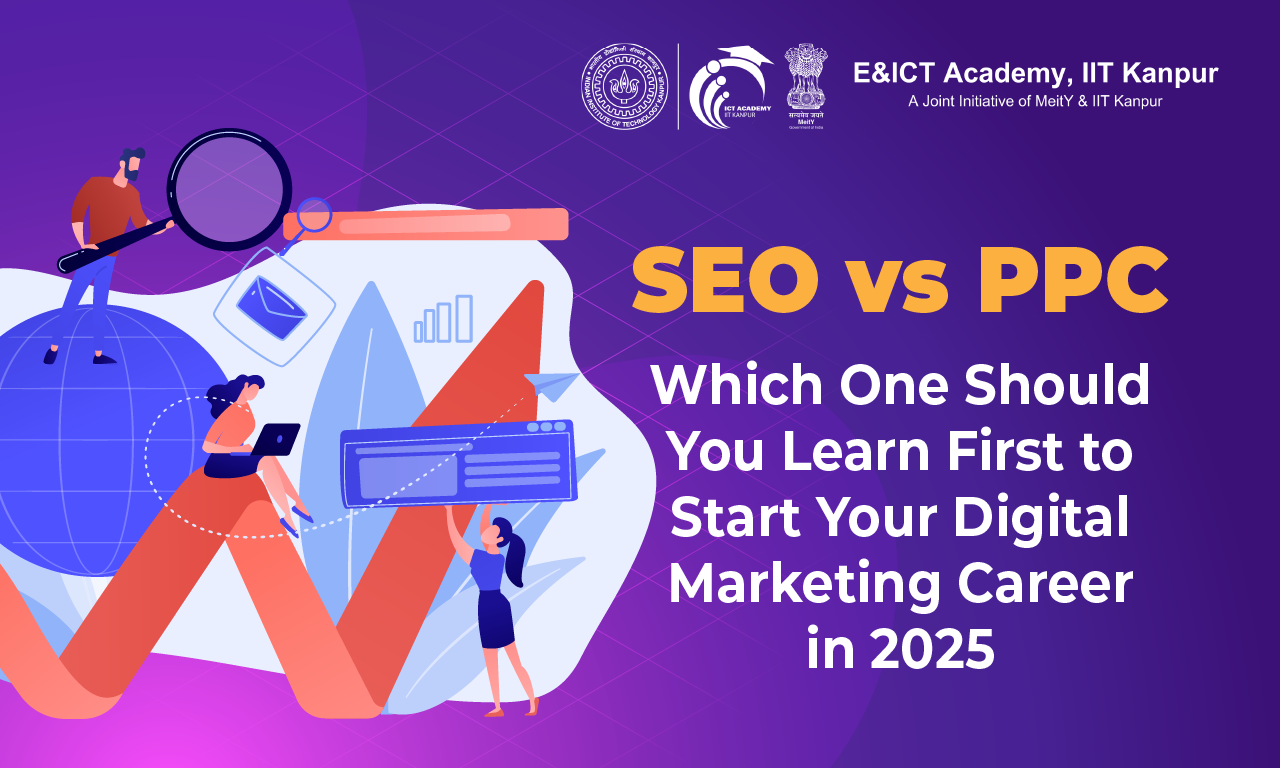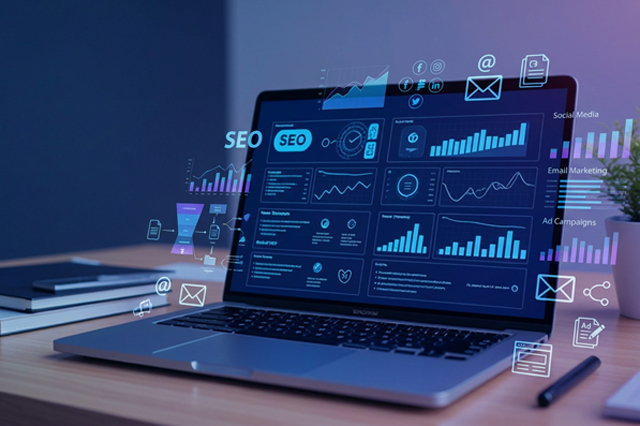SEO vs PPC: Which One Should You Learn First to Start Your Digital Marketing Career in 2026?

SEO vs PPC: The online marketing community relies on two heavyweight strategies: SEO (Search Engine Optimization) and PPC (Pay-Per-Click) marketing.
Although they operate on very different concepts, both are essential for traffic and conversions. Deciding where to begin might be intimidating for novices. So, before starting, ask yourself these questions: Are you interested in the slow-burn, organic nature of SEO or the high-speed, data-driven space of PPC?
Let’s break down their intricacies, future viability, and how they fit with various career goals to make your decision.
Must Read: Is SEO Dead?
What is the Difference Between SEO and PPC
SEO is the process of optimizing websites to rank higher in free search engine results. It includes keyword research, content writing, technical optimization (such as site speed improvements), and earning backlinks. The objective? To drive consistent, free traffic in the long run.
PPC, on the other hand, is the science of purchasing visibility. Advertisers place bids for ad space on search engines (such as Google Ads) or social media (such as Meta Ads), paying every time a user clicks. Outcomes are instantaneous (it’s like opening a faucet)—traffic runs immediately but ceases when the budget exhausts. It’s perfect for fast wins, promotions, or market testing.
Although the SEO vs PPC difference is obvious—organic vs paid, long-term vs short-term—both necessitate a high level of knowledge of user intent and analytics.
Key Differences: Skills, Budgets, and Timelines
While deciding between SEO and PPC, take these three considerations into account:
1. Skill Requirements
- SEO requires versatility, such as technical skills (HTML, site architecture), content planning skills, and knowledge of algorithms that change frequently. Creativity also plays an important role in SEO. Writing copy that satisfies user intent while outranking the competition is equally important as well.
- PPCembraces analytics. The triumph here is about managing bids, testing ad copy A/B, and determining ROI. Tools like Google Ads come with high learning curves, but they’re more formulaic than SEO’s free-form optimization.
2. Budget and Time Constraints
- SEO is cost-effective and for the long-term, but it is slow. It is perfect for bootstrapped startups or bloggers. However, it requires time and patience—you have to spend months tweaking content and tracking rankings.
- PPCoffers speed but demands cash. A well-funded e-commerce brand can launch ads overnight, but costs add up quickly. Mastery in it lies in balancing budgets with conversion goals.
3. Data Interpretation
- PPC provides clear metrics: cost per click, conversion rates, and ROAS (Return on Ad Spend). It’s a numbers game, ideal for data enthusiasts.
- SEO analytics are murkier. Google hides exact ranking factors, so you’ll infer trends from tools like Ahrefs or SEMrush. It rewards strategic intuition as much as data analysis.
Emerging Trends Shaping PPC and SEO Marketing
Here’s how upcoming trends in digital marketing can impact both fields:
AI and Automation
- SEO: AI applications such as ChatGPT are able to spit out content clusters or audit websites, but they can’t replace human intelligence. Google’s E-E-A-T (Experience, Expertise, Authoritativeness, Trustworthiness) system puts human-created content first—imagine first-person product reviews or market analysis. AI is an assistant, not a substitute.
- PPC: Platforms now employ AI for automated bidding and audience targeting. Although this minimizes grunt work, human intervention ensures campaigns are aligned with brand objectives. For instance, AI may optimize for clicks, but a marketer needs to shift if the objective changes to lead quality.
Voice and Visual Search
Voice assistants (Alexa, Siri) and visual search tools (Google Lens) are revolutionizing the way users search for information.
- SEO may need to evolve to natural language (e.g., “Where is the closest vegan pizza to me?”) and image optimization for visual search. Structured data markup will be essential.
- PPC may experience voice-driven Ads or display ad formats, although this is still an emerging space.
Video and Local Strategies Dominate
- SEO YouTube is the world’s second-largest search engine. Video title, description, and transcript optimization will be equally important.
- PPC: Video advertising (YouTube, TikTok) and local services advertising (e.g., Google’s Local Services Ads for lawyers or plumbers) will take up most of the spending.
How to Choose: Aligning SEO or PPC With Your Goals
Neither SEO nor PPC is inherently “better”—your choice depends on your career vision, industry, and personal strengths.
Consider an SEO Course if:
- You like to write, solve problems, and work on long-term projects.
- You want to work with small enterprises, startups, or content-driven brands.
- You’re intrigued by algorithm updates and organic community building (e.g., Reddit’s recent surge in SEO value).
Lean Toward a PPC Course if:
- You love analytics and seeing immediate results.
- You look to work in agencies, high-budget industries (e.g., finance, travel), or e-commerce.
- You desire to excel in tools like Google Ads or Meta Ads Manager, which are coveted in top business roles.
Hybrid Approach: Excellence in PPC and SEO
Eventually, mastery of both SEO and PPC is essential. For example, implementing PPC intelligence to select top-converting keywords for SEO, or utilizing SEO data to optimize ad targeting. A quality digital marketing course covers both areas well, making you competent to think as a whole.
Getting Started: Initial Steps for SEO and PPC
For SEO:
- Learn the Fundamentals: Google’s free SEO Starter Guide and HubSpot’s SEO Course cover essential principles.
- Practice Technical SEO: Leverage tools such as Screaming Frog to audit a site’s crawlability or repair broken links.
- Produce Content: Launch a blog or offer to optimize content for local charities. Monitor rankings through Google Search Console.
For PPC:
- Become Certified: Google Skillshop provides free Google Ads certifications—a resume builder.
- Analyze Data: Review Google Analytics to compare paid traffic conversion to organic.
Final Thoughts
The SEO vs PPC discourse is not about selecting a “winner” but about learning which skill matches your strengths and goals.
Are you interested in storytelling and perseverance? A targeted SEO course may be your destiny. Do you live for spreadsheets and quick testing? A PPC course is the right one for you.
The wonderful thing about digital marketing is that skills accrue. It doesn’t matter where you begin, either with SEO or PPC; proficiency in one will make learning the second a lot simpler. As AI transforms the field, curiosity and flexibility will be more important than the latest tool.
Be responsive, keep trying new things, and allow career aspirations, not trends, to guide you.
Recommended Courses

Foundations of Digital Marketing: Strategy, Execution & Analytics



